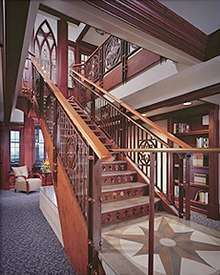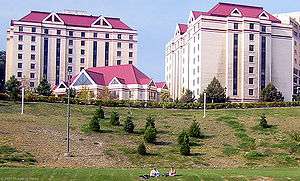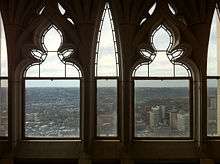University of Pittsburgh Honors College
The University of Pittsburgh Honors College (termed the "Honors College" by students and often abbreviated UHC) is an undergraduate college providing a program of advanced study at the Oakland campus of the University of Pittsburgh in Pittsburgh, Pennsylvania, United States.
| Type | Public |
|---|---|
| Established | 1987 |
| Dean | Brian A. Primack |
| Undergraduates | 800-1200 |
| Location | Pittsburgh , , |
| Campus | Oakland (main) |
| Website | www |

Arising out of the University Honors Program founded in 1978, it transitioned into a college formally dedicated in 1987. The University Honors College provides undergraduate classes that are more challenging and exhaustive than their non-honors counterparts in a wide variety of academic disciplines via collaboration with the other schools of the university.[1] In addition, students are provided with specialized advising and honors housing opportunities.
Rather than having students apply for admission to the UHC and then take classes solely within it, the honors college does not have a formal membership, but is open to all students meeting certain eligibility requirements, or acquiring special permission, and offers flexibility for students to take advantage of its offerings and resources in accordance to their individual motivation.[1]
UHC awards a special Bachelor of Philosophy (B.Phil.) degree to graduates and has successfully helped to culture its students to a school record number of national and international awards including seven Rhodes Scholarships,[2] 10 Marshall Scholarships,[3] 48 Goldwater Scholarships, 11 Truman Scholarships, and seven Udall Scholarships, as well as Churchill and Gates Cambridge scholarships.[4][5][6][7][8]
History
The University of Pittsburgh has a tradition of honors education going back to 1926 when honors courses were implemented in order for students to conduct special individual work under faculty guidance.[9] Although not established as a college of the university until 1987, the University Honors College has its modern origins in the University Honors Program, which began in 1978.[10] The honors program was spearheaded by physics professor G. Alec Stewart, who was appointed to head the program in 1977 and oversaw its opening in January 1978.[4] Stewart suggested extending the honors program into a degree-granting college in 1984,[4] and with the support of then Pitt President Wesley Posvar,[11] the honors program transitioned into a college that was formally dedicated in a ceremony at Heinz Memorial Chapel on February 24, 1987, as part of the university's bicentennial celebration.[12] With the college's dedication, Stewart was installed as its first dean. Besides guiding the growth, principles, and philosophy of the Honors College, Stewart also oversaw the acquisition of a 4,700-acre (19 km2) Allen L. Cook Spring Creek Preserve that was donated to the school in 2006.[13] Stewart served as the dean of the college until his death in 2010.[14] Economics professor Steven Husted was named interim dean while the university conducted a search for Stewart's permanent successor.[15] On May 16, 2011, Pitt named Distinguished Professor of Neuroscience Edward M. Stricker as the new dean of the honors college.[16] Stricker announced his plan to step down in June 2016, and Brian Primack was named as his successor effective July 2017.[17][18]
Structure and housing

Throughout its history, the University Honors College has never been a membership organization, instead allowing participation in its offerings to all motivated university students who have maintained a minimum grade point average.[10] However, incoming freshmen are required to meet certain eligibility requirements, including a minimum SAT score and/or minimum placement test score(s), in order to enroll in honors courses and be eligible for honors community housing. Other continuing students not meeting such requirements may still gain special permission to take UHC classes, which is decided on a case-by-case basis.[19]
Specialized honors "Living Learning Community" housing is provided for students taking UHC-offered courses in the same residence halls. Honors student housing was first established in the fall of 1998 in the newly opened Forbes-Craig Apartments. At some point after 1998, the first-year University Honors College Living Learning Community was established in Litchfield Towers until the 2006-2007 school year,[20] after which it was moved to Forbes Hall.[21] In the fall of 2011, it moved to its current location in the west wing of Sutherland Hall, and houses 408 first-year honors students.[22][23] Living Learning Communities for sophomore and junior students had been maintained in both McCormick Hall and Forbes-Craig halls, but after the 2006-2007 school year, they were consolidated into Forbes-Craig Apartments which houses over 100 honors students and is located directly across from the Carnegie Museum of Art.[24] The Honors College added another 200 beds by establishing Brackenridge Hall as an upperclassman honors dormitory in the fall of 2012.[25]
Academic offerings and community

The University of Pittsburgh Honors College offers between 70 and 80 undergraduate courses each year, from introductory courses to upper-level seminars.[26] The UHC focuses on providing small class sizes (usually restricted to 18 or fewer students), and faculty who must present detailed course proposals before teaching classes. This is done to ensure that UHC courses continue to focus on in-depth examination of course material rather than accelerated programs which would cover more ground.[26]
The University Honors College offers students the opportunity to earn the Bachelor of Philosophy degree in their major.[27] The degree, unrelated to the study of philosophy, is awarded jointly through the UHC and any of the University of Pittsburgh's other undergraduate programs in recognition of a rigorous course of study, and ends with an undergraduate thesis. The University Honors College has had the authority to award such a degree since 1987.[27]
The honors college also provides the programs such as The American Experience Distinguished Lecture Series[28] and the Brackenridge Fellowship Program, which supports the research endeavors of 52 undergraduate fellows.[29]
Various student groups exist within the honors college including the Student Honors Activities Council, which plans a variety of cocurricular events for honors students,[30] as well as the Pitt Quiz Bowl team,[31] and various other clubs such as the Pizza and Plays, and Pizza and Prose book clubs.[32]
The honors college produces four publications including an award-winning undergraduate literary magazine founded in 1995, the Three Rivers Review,[33] and Collision Magazine, which publishes nonfiction prose and poetry.[34] Other publications include Pitt Political Review[35] and the Pittsburgh Undergraduate Review.
Pittsburgh Undergraduate Review

The Pittsburgh Undergraduate Review [36] is a multi-disciplinary, undergraduate, refereed academic journal published by the Honors College. Founded in 1980,[37] it is published annually, with recent issues available online.[38] The journal publishes original, scholarly research articles authored by undergraduate students. Submission of articles is open to students at any institution throughout the world, although the journal is an English-only publication.[39] The majority of submissions involve topics in the humanities, arts, and social sciences.[40]
The journal's thorough refereeing process is modeled on that utilized by professional academic journals.[41][42] Submitted articles are reviewed for originality, clarity, reasoning, and research by at least two experts in a relevant field, pooled from faculty at the University of Pittsburgh and other institutions.[43]
The National Collegiate Honors Council supported the journal's founding, which at the time was the first peer-reviewed undergraduate academic journal in the country.[44] The Council also helped to establish the Edythe Portz Prize, which rewards each year's best overall submission. The journal was recognized by The New York Times in 2001.[45]
Location
The University Honors College is housed on the 35th and 36th floors of the Cathedral of Learning. The location of the honors college near the top of the Cathedral of Learning affords students and visitors with large vistas of the campus and surrounding city. In 2002-2003, a renovation to the Honors College's space was completed by Rothschild Doyno Collaborative of Pittsburgh's Strip District. The four-leaf medieval quatrefoil medallion at the top of the Cathedral is a central motif in the design of Honors College. Stained glass behind the reception desk at the center of the space was designed by Glenn Greene Glass of Regent Square and centers on a design representing the four seasons, done in polished agate. Wrought ironwork was produced by Vic Reynaud of Technique Manufacturing in the spirit of Samuel Yellin, who did the Commons Room ironwork.[46]
See also
- Three Rivers Review, UHC-sponsored undergraduate literary magazine
References
- University of Pittsburgh Honors College Website, Overview, Archived 2007-05-13 at the Wayback Machine. Accessed May 25, 2007.
- Hart, Peter (2011-11-23). "Pitt garners seventh Rhodes". University Times. 44 (7). Pittsburgh: University of Pittsburgh. Retrieved 2011-12-01.
- "Pitt senior awarded Marshall Scholarship". University Times. Pittsburgh, PA. 2012-12-06. Retrieved 2012-12-06.
- "G. Alec Stewart, Dean of the University Honors College, Bernice L. and Morton S. Lerner Chair, and Professor of Physics at the University of Pittsburgh, Dies" (Press release). University of Pittsburgh. 2010-04-08. Retrieved 2010-04-08.
- Kane, Karen; Balingit, Moriah (2009-11-23). "Pitt graduate wins Rhodes scholarship". Pittsburgh Post-Gazette. Pittsburgh, PA. Retrieved 2010-05-25.
- White, Patricia Lomando (2011-04-04). "Pitt Neuroscience Student From Pennsylvania Awarded Goldwater Scholarship". Pitt Chronicle. Pittsburgh, PA: University of Pittsburgh. Retrieved 2011-04-07.
- Masset, Cara (April 3, 2013). "Pitt Students Garner Three Goldwater Scholarships, a Udall Scholarship, and an Honorable Mention in Each of the Competitions" (Press release). University of Pittsburgh News & Media Relations.
- "Goldwater Scholarship Awarded to Pitt Junior Alexandre Gauthier" (Press release). University of Pittsburgh News Service. June 12, 2014. Retrieved June 13, 2014.
- Starrett, Agnes Lynch (1937). "College of Liberal Arts and Sciences". Through One Hundred and Fifty Years: The University of Pittsburgh. Pittsburgh, PA: University of Pittsburgh Press. p. 506. Retrieved 2010-10-13.
- University of Pittsburgh Honors College Website, History and Philosophy, Archived 2007-06-10 at the Wayback Machine. Accessed May 25, 2007.
- Chute, Eleanor (1985-06-19). "Pitt plan for changes 'less dramatic' than expected". The Pittsburgh Press. Pittsburgh, PA. Retrieved 2010-05-25.
- "Pitt dedicates new college". Pittsburgh Post-Gazette. Pittsburgh, PA. 1987-02-21. Retrieved 2010-05-25.
- Gugliotta, Guy (2006-08-13). "Jurassic Park". The Washington Post. Washington, DC. Retrieved 2010-05-25.
- Nereim, Vivian (2010-04-08). "Obituary: Glenn Alexander Stewart / Physicist, founder and dean of Pitt Honors College". Pittsburgh Post-Gazette. Pittsburgh, PA. Retrieved 2010-05-25.
- Schackner, Bill (2010-05-25). "Pitt names interim dean of honors college". Pittsburgh Post-Gazette. Pittsburgh, PA. Retrieved 2010-05-25.
- Schackner, Bill (2011-05-16). "Pitt names new dean of honors college". Pittsburgh Post-Gazette. Pittsburgh, PA. Retrieved 2011-05-16.
- Bakalarski, Alexa (2016-06-21). "Edward Stricker steps down as Honors College dean". Pitt News. Pittsburgh, PA. Retrieved 2018-09-09.
- McConville, Emily (2017-06-05). "University of Pittsburgh names new honors college dean". Pittsburgh Post-Gazette. Pittsburgh, PA. Retrieved 2018-09-09.
- "About University Honors College: Eligibility". University of Pittsburgh. 2008-10-02. Retrieved 2010-10-07.
- University of Pittsburgh 2006-2007 Residential Handbook, pg. 25.
- University of Pittsburgh Honors College Website, Honors Housing. Archived 2010-02-28 at the Wayback Machine. Accessed May 25, 2007
- Panther Central: Residence Hall Living (PDF). University of Pittsburgh. 2011. p. 23. Retrieved 2011-08-11.
- "First-Year Honors Housing". University of Pittsburgh. 2011-08-17. Retrieved 2011-12-01.
- "Upperclass Honors Housing". University of Pittsburgh. 2010-02-24. Retrieved 2010-10-07.
- Barlow, Kimberly K. (2012-01-26). "Dean delivers State of the Honors College address". University Times. 44 (10). University of Pittsburgh. Retrieved 2012-02-06.
- University of Pittsburgh Honors College Website, Academics. Archived 2007-05-13 at the Wayback Machine. Accessed May 25, 2007.
- University of Pittsburgh Honors College Website, BPhil description. Archived 2007-02-09 at the Wayback Machine. Accessed May 25, 2007.
- "The American Experience Distinguished Lecture Series". University of Pittsburgh. Retrieved 2010-10-07.
- Giazzoni, Mike (Winter 2011–2012), "Brackenridge Fellowship Expanded to Fall and Spring" (PDF), University of Pittsburgh Honors College Newsletter, University of Pittsburgh Honors College: 3, retrieved 2012-02-06
- "Student Honors Activities Council". University of Pittsburgh. 2010-02-24. Retrieved 2010-10-07.
- "About PQB". Retrieved 2010-10-07.
- "Academic Community". University of Pittsburgh. 2010-07-12. Retrieved 2010-10-07.
- "Three Rivers Review". University of Pittsburgh. 2010-09-17. Retrieved 2010-10-07.
- "Collision Literary Magazine". University of Pittsburgh Honors College. Retrieved 2010-10-07.
- "Pitt Political Review". University of Pittsburgh. 2007-10-31. Retrieved 2010-10-07.
- ISSN 0734-3140
- "About PUR". Pittsburgh Undergraduate Review. Retrieved 2008-08-27.
- "Past Issues". Pittsburgh Undergraduate Review. Retrieved 2008-08-27.
- "Standards of Publication". University of Pittsburgh Honors College. 2009. Retrieved 2010-09-04.
- "The Independent Researcher: A Model that Works" (PDF). CUR Quarterly. Reading, PA: Council on Undergraduate Research. 28 (1): 24. Fall 2007. Retrieved 2010-09-04.
- "Submission Review Process". Pittsburgh Undergraduate Review. Retrieved 2008-08-27.
- Digby, Joan (2005). Peterson's Smart Choices: Honor Programs & Colleges (4th ed.). Lawrenceville, NJ: Thomson Peterson's. p. 461. ISBN 0-7689-2141-4. Retrieved 2010-09-04.
- "EUREKA!: Presenting and Publishing Your Work". Austin, TX: The University of Texas at Austin. 2009-09-26. Retrieved 2010-09-04.
- Meisel, Mara (1984-02-29). "Pitt student wins elite scholarship". The Pittsburgh Press. Pittsburgh, PA. Retrieved 2010-09-05.
- "About PUR". Pittsburgh Undergraduate Review. Retrieved 2008-08-27.
- "UHC: Architecture". University of Pittsburgh. 2007-10-31. Archived from the original on 2010-06-09. Retrieved 2010-05-25.
External links
- UHC Home Page University of Pittsburgh Honors College main page
- UHC course offerings in recent past and future semesters, with instructors
- Pittsburgh Undergraduate Review
_seen_from_the_Cathedral_of_Learning_With_Numbered_Callouts_May_14%2C_2010.jpg)